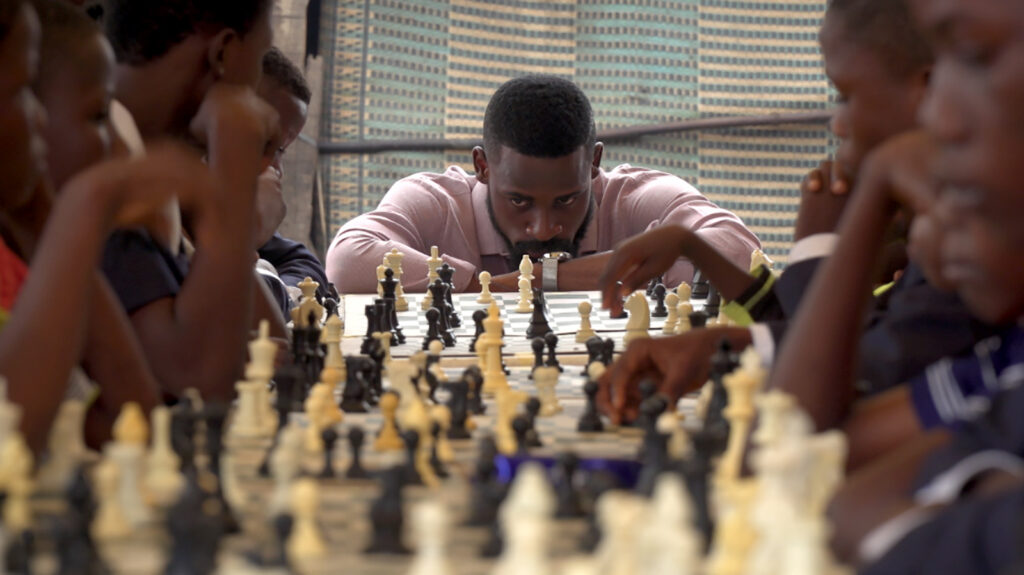Trends
Meet Tunde Onakoya, The Founder of Chess in Slum Initiative
Here is everything to know about Tunde Onakoya, the Founder of the Chess In Slum Initiative and humanitarian service to the Nigerian community.

Tunde Onakoya, the founder of Chess in Slum Initiative, is currently trending on Twitter after the American media personality Paris Hilton applauded him for his humanitarian service to the Nigerian community.
Tunde has been making headlines recently due to his humanitarian impact in several slums in Lagos, through his Chess in Slum Initiative. A few months back one of his proteges, Ferdinand Maumo, a 10-year-old born in Makoko with cerebral palsy, a speech impediment, and could hardly speak English won a chess champion in one of the slums in Lagos State.
This not only caught the attention of the masses but also that of the Governor of Lagos State, Babajide Sanwo-Olu who invited Fedinard for a game and gifted a sum of 1 million Naira for his welfare.
Not long after, Tunde organized another tournament for unprivileged children living under the bridge in Oshodi, Fawaz Adeoye, an 18-year-old bus conductor won the tournament, which put in him the spotlight to receive a donation of more than 2 million Naira.
Prior to these recent victories, Tunde Onakoya is notorious for picking children in the street and improving their welfare and providing for their basic needs.
Who is Tunde Onakoya?
Tunde Onakoya was born on the 6th of October 1994 in Isale Odo a slum community in Ikorodu. His father was a Bus Driver and his mother a Petty trader.
Due to the family’s poor financial status and the deteriorating status of the father’s Job, Tunde couldn’t go to secondary school. He had to sacrifice for his younger brother as his parents couldn’t afford both school fees at the same time.
As he was not going to school, He regularly visited a barbershop in his vicinity to play the PS1 game console. which is where he learnt about the Chess game. Tunde noted that he saw the way the chess pieces were carved and he instantly loved it.
He started begging the barber to teach him how to play but he ignored him. Eventually, Tunde learnt how to play and the rules of the game by watching the barber and his friends while they played.
Things got better for him after his mother offered to work for an expensive school in exchange for her son’s education, his mother worked there for six years and resigned on the day he wrote his final exams
It was at this school, he perfected his chess skills due to the school’s active chess club and won his first chess trophy where he came third in the tournament organized by the school. After the chess tournament, he began to play chess and was representing the school in external tournaments. he travelled for competitions and competed with other prestigious schools including King’s College on Lagos Island.
After completing his secondary education, he furthered his education at the Yaba College of Technology, where he joined the college chess team and represented the school at the Nigerian Polytechnic games association tournament and they won all the gold medals, he was also a double gold medalist and went on to win the gold medal at RCCG chess championship.
He won other chess competitions such as the National friends of chess, Chevron chess open and was ranked the 13th best player in chess in Nigeria. He was able to survive in school on his winnings from chess tournaments, despite not getting any allowances from his parents.
After graduating from Yaba Tech with nothing productive to do, He and a few of his chess who were unemployed began to teach children in schools how to play chess for a very little amount. He quit the job In 2018 when he began the Chess In slum Initiative.
How Tunde Began The Chess in Slum Initiative.
Tunde Onakoya once revealed in an interview that he got the inspiration to start the initiative when he visited Majidun, a slum community in Lagos state. He stated that his visit to the slum in 2018, which made him see how children in the slum lived.
He noted that most of the kids were not growing up in the right environments, as the area wasn’t conducive to stay and most of them were without education and proper upbringing because most of their parents are thugs and cultists with no sense of responsibility
He said: I went back to where I grew up and saw that nothing had changed. There were still children on the streets without access to education. In a rapidly evolving world, I feared that those children were never going to get the opportunity to live out their true potential. I started thinking about what I could do in my own capacity. At the time I was already a National Master of chess, so I and my friends took a few chess boards back to the community and started teaching the children chess as a way to get them off the streets, engage their minds and teach them skills that would expose them to opportunities beyond the confines of their environment. That was how it all started
He further stated that if the children continued living like that in the slum they’d probably end up becoming like their parents. He noted that he thought of introducing chess to these vulnerable children as a way to promote learning and enhance intellectual development. He said It was his own way of giving them a new kind of leverage as most of them couldn’t afford to go to school.
He went back to the slum in the same year and took permission from the head of the community, who in turn gave them a place where they could teach the kids chess. He and his friends taught the children chess, give them food, teach them and take pictures with them. It was fun.
Funding the project was a little bit difficult as he wasn’t financially buoyant, he began posting the movement on Twitter, which led people to start volunteering and contributing to the cause. the Initiative eventually went viral and led to them being featured on BBC, CNN and many other international news platforms.
According to Tunde Onakoya, the project is currently at a place where they’re trying to spread and impact more kids. He believes that chess can change the lives of children in poor communities in Africa. They don’t necessarily have to become a chess champion, but they’d learn how to think and their horizons will expand beyond their small communities. Chess in the slum has also secured deals with international chess organizations. In three years they’ve impacted the lives of 300 children, with 30 of them on lifelong scholarships.


